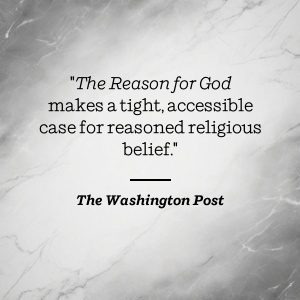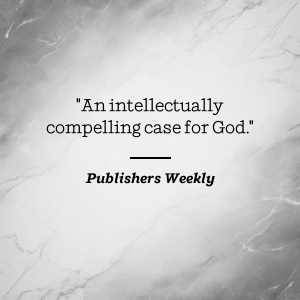Customer Services
Copyright © 2025 Desertcart Holdings Limited
Desert Online General Trading LLC
Dubai, United Arab Emirates


Full description not available



J**R
Back to the basics
My Rating: Must readLevel: Medium length, around 250 pages; moderate read, some parts are a little philosophical or scientific.SummaryThe title is fairly clear. This is an apologetic work for why Keller thinks there is a reason for God's existence, specifically the God of the Bible. The book is broken into two parts - The Leap of Doubt, and The Reasons for Faith. The former deals with criticisms or issues that skeptics may have for God, while the later gives proofs. There is also a introduction and an epilogue.Each of the parts are broken into seven chapters: There Can't be Just One Religion, How Could a Good God Allow Suffering, Christianity is a Straightjacket, Science has Disproved Christianity, and You Can't Take the Bible Literally for part one. Part two includes: The Clues of God, The Knowledge of God, The Problem of Sin, Religion and the Gospel, The (True) Story of the Cross, The Reality of the Resurrection, and The Dance of God.My ThoughtsSo, my first thought is that since this book is a little old, and highly influential, not much may seem new to you. Obviously, Keller didn't invent arguments for God, he is using what is out there, but the way he so intelligently and succinctly puts everything together really stands out and has permeated the reformed/evangelical world over the past decade plus.Even with that, I think this is a must read for most Christians, as it is more or less an Apologetics 101 in a relatively short book. Again, I think some of the arguments may seem well known, especially the the response to the 'critique' that all religions are the same. In some ways this critique is so intellectually lazy, that it should be ignored, but it really can't be. For one, most Christians don't take the Bible seriously enough to care whether it is true, but more importantly, on a philosophical level, the idea that the divergent thoughts of some many religions could all 'be the same' really needs to be shut down quickly. Now, that doesn't get you to a 'god' and certainly doesn't get you to the God of the Bible, but this line of thinking is internet atheist level ignorance.Overall, I think the defense (part 1) section of the book is valuable in teaching people the critiques that are out there, even if some are weak. That isn't to diminish some of the questions, most of these are thinks Christians have wrestled with for centuries. I think this section is especially valuable for new Christians or high schoolers (or parents of high schoolers), because that is about the time when people will go off and find their first criticisms of religion, especially as the go on and live their beliefs on their own.I have mixed thoughts on the second part, not because isn't good (it is great, actually), but because of my own views on the 'self-evident' type arguments. On one hand, I believe the proof chapters are the most important, but on the other, I find some to be less compelling. I'm skeptical of arguments for clues of God or knowledge of God. Now, Romans tells us that the 'law' is written on the hearts of all people, and there is some clear acknowledgment of this. For instance, read Sapiens or many high level works on Physics, and you'll get to some 'universal constant' or 'unifying theory of all', but I wonder how compelling this is to non-believers. For the angry/internet atheist, they already believe in God, they are just angry at him. For the agnostic, they know there is something out there, their question is more on the comprehensibility (even if the couch it in 'knowability'). Keller admits, even if someone acknowledges some level of 'higher power', we still don't necessarily have the Trinitarian God of orthodox Christianity.Which is why I think the latter part of section two is so important. Modern evangelism is over run with 'the feels', an everlasting by-product of Charles Finney (and the impact of Schleiermacher and the Enlightenment), in which we describe what we 'know' about God/Christ by how it has impacted out life. We explain Christ in what he has done for us. This is a non-Biblical practice. We don't know Christ is Lord because he is 'in our hearts', we know because the resurrection is fact.The most skeptical thing you can say is that the earliest believers accepted the resurrection as fact. I think this is truly the starting point for anyone interest in apologetics or skepticism. People died for this belief, people only decades after Christ died. There has to be a reason, and it also lends credence to truth and reliability of the Bible. Far too many Christians are unaware of this, either through lack of care or critical thinking or challenge or knowledge of history. Again, this is a great, important section for new believers and high schoolers, especially those headed to college, because these are the base facts of our beliefs.Paul himself says that if the resurrection doesn't exist, we (that is Christians) are the most of all to be pitied. Yet far too many of us can't easily explain why we believe what we believe as a truth (often, if we can, it is only as a 'feels'). This book is a must read for all Christians either as your first run, teaching you the basics of reason and understanding, or the older Christian as a reminder on the basics of the truths to which we believe.More reviews at MondayMorningTheologian.com
L**N
Good Reasons for Believing in God!
I believe it was in 1988 when I attended a weekend conference in New Jersey where Tim Keller was the speaker. He was then telling people about his plans to move to New York City, to Manhattan, to start a conservative Presbyterian church there. He felt called to minister to a large city population at a time when many churches were fleeing to the suburbs. Dr. Boice, the then senior pastor of Tenth Presbyterian Church in downtown Philadelphia, had a similar commitment to large city ministry and I have often wondered if he had influenced Keller in his decision. I don't know the answer to that question. On the other hand, many wondered at Keller's decision. Probably not because of any lack of perceived need but rather because of the magnitude of the task. He wasn't proposing to join an already established conservative, evangelical ministry (there probably wasn't one, all of the old ones had already left), but rather to start one in downtown Manhattan! I moved to Wichita in 1990 and have heard very little of Keller since then. This book, Reason for God, is the first book of Keller's that I have read. I was delighted to read it not only because of the content (more below - this is a review!) but also because it has filled in the details of his Manhattan ministry. He has apparently been wildly successful in his endeavors! I learned about this book from Lauren Green on the Fox News channel, Green being a member of Keller's congregation. This book is based on Keller's ministry and experiences with the skeptical residents of Manhattan. What are the real questions that people are asking? What answers does the Christian faith have to offer to those questions? Just how relevant is Christianity to this modern world? How best can Christianity be presented to skeptical enquirers? Is this the Apostle Paul in Athens or in Corinth? No, it is Keller in Manhattan! According to New York magazine: "With intellectual, brimstone-free sermons that mange to cite Woody Allen alongside Matthew, Mark, Luke, and John, Keller draws some five thousand young followers every Sunday. Church leaders see him as a model of how to evangelize urban centers across the country, and Keller has helped 'plant' fifty gospel-based Christian churches around New York plus another fifty from San Francisco to London."Keller encourages his readers to doubt, Christians as well as unbelievers. In the Introduction he writes: "People who blithely go through life too busy or indifferent to ask hard questions about why they believe as they do will find themselves defenseless against either the experience of tragedy or the probing questions of a smart skeptic." "Believers should acknowledge and wrestle with doubts - not only their own but their friends' and neighbors'." "My thesis is that if you come to recognize the beliefs on which your doubts about Christianity are based, and if you seek as much proof for those beliefs as you seek from Christians for theirs - you will discover that your doubts are not as solid as they first appeared." And with this he sets the stage for dialogue about serious questions. Throughout the book he uses this approach. Have you really understood the Christian message? If you doubt it, upon what are your doubts based? Are those doubts justified? For example, in Chapter 1 he discusses doctrine and how many think that doctrine is harmful and that what really matters are the teachings of major religions that seem similar. He responds as follows: "Ironically, the insistence that doctrines do not matter is really a doctrine itself. It holds a specific view of God, which is touted as superior and more enlightened than the beliefs of most major religions. So the proponents of this view do the very thing they forbid in others."Granted that at least some evil in the world does pose a problem, but I think Keller's take on it is a good one. He writes in Chapter 2: "Tucked away within the assertion that the world is filled with pointless evil is a hidden premise, namely, that if evil appears pointless to me, then it must be pointless. Again the reasoning is, of course, fallacious. Just because you can't see or imagine a good reason why God might allow something to happen doesn't mean there can't be one. [Remember Job.] Again we see lurking within supposedly hard-nosed skepticism an enormous faith in one's own cognitive faculties. If our minds can't plumb the depths of the universe for good answers to suffering, well, then, there can't be any! This is blind faith of a high order." Later in the same chapter he displays the fallacious logic of the atheist concerned with justice: "On what basis, then, does the atheist judge the natural world to be horribly wrong, unfair, and unjust? The nonbeliever in God doesn't have a good basis for being outraged at injustice, which, as Lewis [C.S. Lewis] points out, was the reason for objecting to God in the first place. If you are sure that this natural world is unjust and filled with evil, you are assuming the reality of some extra-natural (or supernatural) standard by which to make your judgment."Reminiscent of Phillip Johnson's lecture at Princeton University "Can Science Know the Mind of God?", Keller writes in Chapter 8: "if we can't trust our belief-forming faculties to tell us the truth about God, why should we trust them to tell us the truth about anything, including evolutionary science? If our cognitive faculties only tell us what we need to survive, not what is true, why trust them about anything at all? . . . If we believe God exists, then our view of the universe gives us a basis for believing that cognitive faculties work . . . I want to demonstrate that you already know that God does exist . . . belief that we cannot prove but can't not know."This is a good read, not only for Christians who want a better understanding themselves of basic issues of faith and to be able to give better answers to those who ask, but it is also a good read for non-Christians who are asking questions.
Z**N
Great book quality and great read!
Great read and high quality book cover and pages, do not put in a bag or the cover page will fold or tear up slowly over time!
Trustpilot
2 weeks ago
2 weeks ago